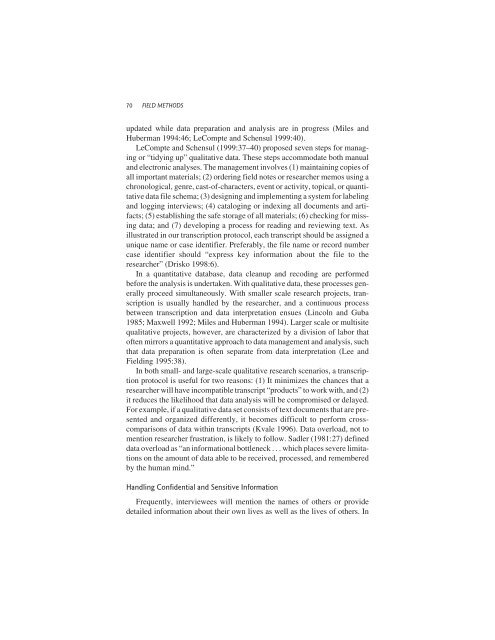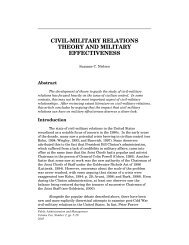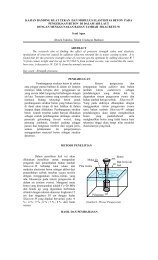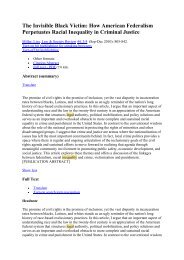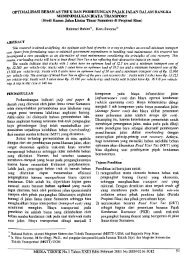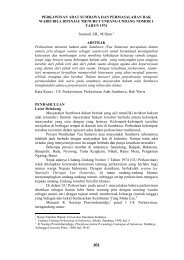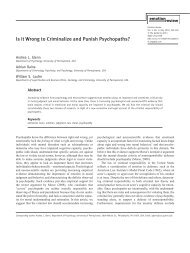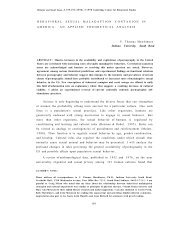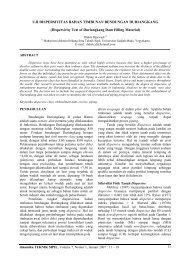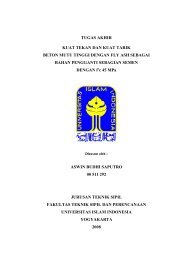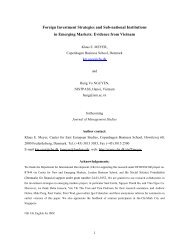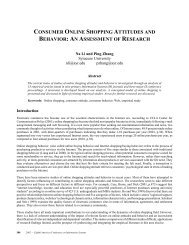Beyond the Qualitative Interview: Data Preparation and ... - E-Journal
Beyond the Qualitative Interview: Data Preparation and ... - E-Journal
Beyond the Qualitative Interview: Data Preparation and ... - E-Journal
Create successful ePaper yourself
Turn your PDF publications into a flip-book with our unique Google optimized e-Paper software.
70 FIELD METHODS<br />
updated while data preparation <strong>and</strong> analysis are in progress (Miles <strong>and</strong><br />
Huberman 1994:46; LeCompte <strong>and</strong> Schensul 1999:40).<br />
LeCompte <strong>and</strong> Schensul (1999:37–40) proposed seven steps for managing<br />
or “tidying up” qualitative data. These steps accommodate both manual<br />
<strong>and</strong> electronic analyses. The management involves (1) maintaining copies of<br />
all important materials; (2) ordering field notes or researcher memos using a<br />
chronological, genre, cast-of-characters, event or activity, topical, or quantitative<br />
data file schema; (3) designing <strong>and</strong> implementing a system for labeling<br />
<strong>and</strong> logging interviews; (4) cataloging or indexing all documents <strong>and</strong> artifacts;<br />
(5) establishing <strong>the</strong> safe storage of all materials; (6) checking for missing<br />
data; <strong>and</strong> (7) developing a process for reading <strong>and</strong> reviewing text. As<br />
illustrated in our transcription protocol, each transcript should be assigned a<br />
unique name or case identifier. Preferably, <strong>the</strong> file name or record number<br />
case identifier should “express key information about <strong>the</strong> file to <strong>the</strong><br />
researcher” (Drisko 1998:6).<br />
In a quantitative database, data cleanup <strong>and</strong> recoding are performed<br />
before <strong>the</strong> analysis is undertaken. With qualitative data, <strong>the</strong>se processes generally<br />
proceed simultaneously. With smaller scale research projects, transcription<br />
is usually h<strong>and</strong>led by <strong>the</strong> researcher, <strong>and</strong> a continuous process<br />
between transcription <strong>and</strong> data interpretation ensues (Lincoln <strong>and</strong> Guba<br />
1985; Maxwell 1992; Miles <strong>and</strong> Huberman 1994). Larger scale or multisite<br />
qualitative projects, however, are characterized by a division of labor that<br />
often mirrors a quantitative approach to data management <strong>and</strong> analysis, such<br />
that data preparation is often separate from data interpretation (Lee <strong>and</strong><br />
Fielding 1995:38).<br />
In both small- <strong>and</strong> large-scale qualitative research scenarios, a transcription<br />
protocol is useful for two reasons: (1) It minimizes <strong>the</strong> chances that a<br />
researcher will have incompatible transcript “products” to work with, <strong>and</strong> (2)<br />
it reduces <strong>the</strong> likelihood that data analysis will be compromised or delayed.<br />
For example, if a qualitative data set consists of text documents that are presented<br />
<strong>and</strong> organized differently, it becomes difficult to perform crosscomparisons<br />
of data within transcripts (Kvale 1996). <strong>Data</strong> overload, not to<br />
mention researcher frustration, is likely to follow. Sadler (1981:27) defined<br />
data overload as “an informational bottleneck . . . which places severe limitations<br />
on <strong>the</strong> amount of data able to be received, processed, <strong>and</strong> remembered<br />
by <strong>the</strong> human mind.”<br />
H<strong>and</strong>ling Confidential <strong>and</strong> Sensitive Information<br />
Frequently, interviewees will mention <strong>the</strong> names of o<strong>the</strong>rs or provide<br />
detailed information about <strong>the</strong>ir own lives as well as <strong>the</strong> lives of o<strong>the</strong>rs. In


